We had a chat with Dougie McLaren at Forth Farming, a family-run enterprise in Central Scotland, consisting of beef, sheep and crops. The family bought a Fendt Rotana 160V Baler from Rory McKendrick, Area Sales Manager at R&R Machinery.
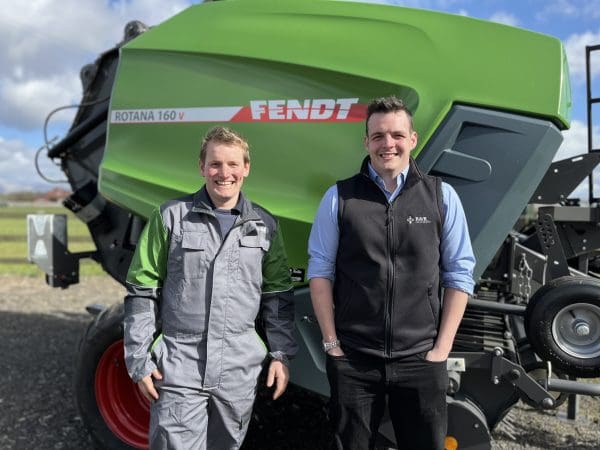
Dougie – I work in partnership alongside my mum, my dad and my brother. Our home farm is in Alloa, where we’re a mixed unit with sheep, beef and arable. We’re farming about 1,200 acres, including 800 acres of arable land, and the rest being hay silage and grazing.
We also do some contracting work for neighbouring farmers – bale silage, spring fertiliser, lime spreading, digger work, anything really…
Dougie – The farm has been in my family for probably about 100 years. My grandfather started it, and then it went to my dad and my uncle. In 2015, my uncle and cousins moved to another farm, which they now run independently of us.
Dougie – We calve about 80 Limousin-cross sucklers, and lamb about 550 cross-ewes. We finish all their offspring on the farm. Occasionally, we buy in some store cattle and lambs, and we finish them too.
The cattle are kept inside from October to April, while the sheep come inside only for the lambing season in spring and go back outside after that. We produce almost all of our own feed, which is handy. The cattle are on barley and beans for the protein and we buy in some minerals. The sheep are on a home blend, which is whole oats, whole beans, bruised barley. All we really buy in is sugar beet, soya and minerals.
We sell some cattle to Scotbeef and the sheep go to either United Auctions Market or Scotbeef, depending on their weight.
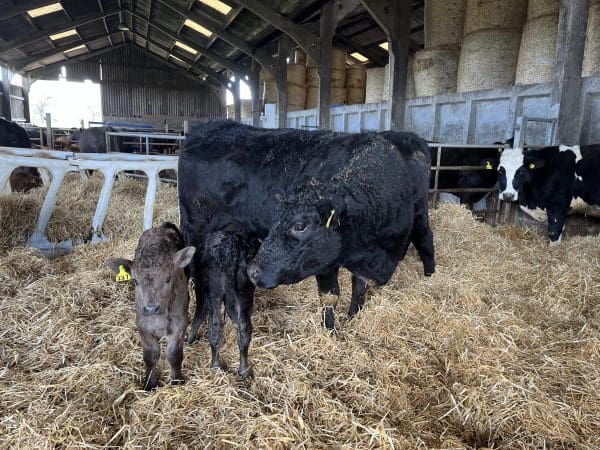
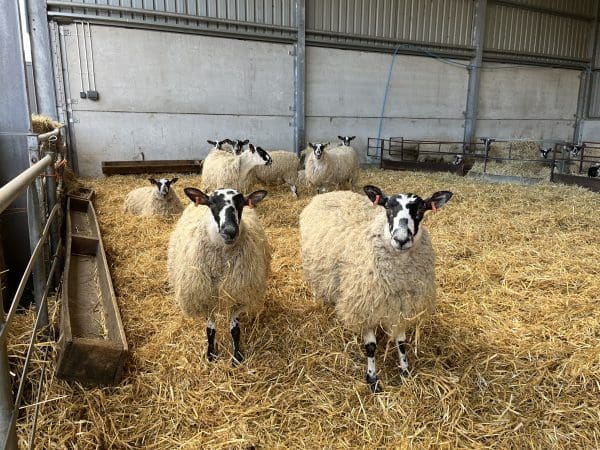
Dougie – We grow winter barley, oilseed rape, winter wheat, spring barley, winter beans, spring beans, and spring oats. We use JDW Agri for our agronomy.
Dougie – We’re busy all year round, and that’s the worst thing about our enterprise! We’re only really a bit quieter from November to February.
Dougie – Like all farmers, the weather seasons are getting more and more unpredictable. The majority of the ground that we farm is heavy clay, so the weather plays a crucial part.
Again, like all farmers, we’re facing worrying price increases – machinery, fertiliser, sprays, etc – and another problem is the volatility of our end-markets. That’s where we’re fortunate that we run a mixed enterprise.
Dougie – We’ve always had two balers; one has a chopper for doing the silage, and the other one is more like a backup, if we get caught out with straw. I was on the lookout for a new machine to replace our main one, because we were having some issues.
A couple of my friends had that exact same Fendt model of baler, and I’d heard good reports, so I was keen to have a go at it. It was very impressive in its demo, so it never actually left the farm after that!
Rory – It was at the beginning of July, last year. Dougie phoned up and asked if I had anything around, just out of interest. I don’t think he had much intention of buying, at that time, but I thought, let’s give it a go.
This Fendt Rotana 160V Baler was available in our Cupar depot. It was already demoed, it’d only done a hundred bales, and it was PDI’d and ready to go. Myself and Michael Quinn (Product Specialist) fitted the baler to a tractor and headed out to complete the demo.
Dougie – You stayed with us late that night, helped us set it up and made sure we knew all the features and the settings of the baler. It was really impressive.
“It was very impressive in its demo, so it never actually left the farm after that!”
Dougie – One of our customers does one cut of silage a year, and it’s always a heavy crop. It’s horrible stuff to bale, it pulls in from underneath the tractor. Sometimes in the past, fellow farmers with other brands of balers helped us out to get the job done, but they also found it difficult stuff to bale. Rory said that the Rotana could bale three bouts of silage into one. I didn’t believe him, but I was proved to be wrong. It did!
Rory – I knew what the baler’s capabilities were – and I could see the smile on Dougie’s face, when the baler was working in the heavy crop with little effort.
Dougie – I like how simple it is to operate and the computer is easy to navigate. It can be fitted to all our tractors, so it needs to be practical for everyone to operate. It’s very easy to work the pickup reel, knives and drop floor, all from one spool.
It also saves time when coupling and un-coupling the baler to the tractor. Another great feature is the drop floor – if the baler does choke, the drop floor makes it easy to clear.
Rory – Within the settings on the touchscreen box, you can change the density from 1-10, or have the baler making a soft core centre to your preferred size. The box is easy to use, along with being very accurate. You can adjust how you want to make a bale throughout the day when moving fields or when the conditions change.
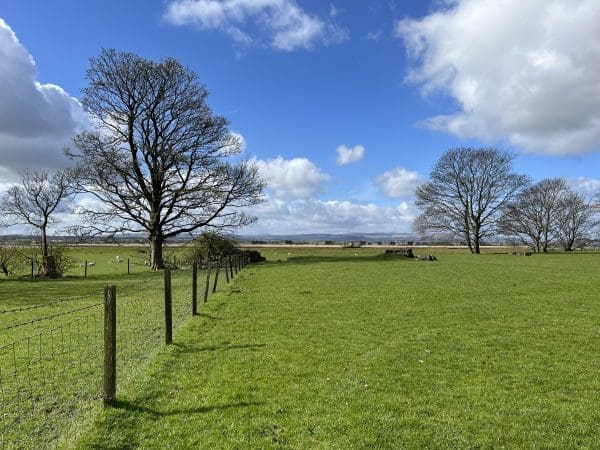
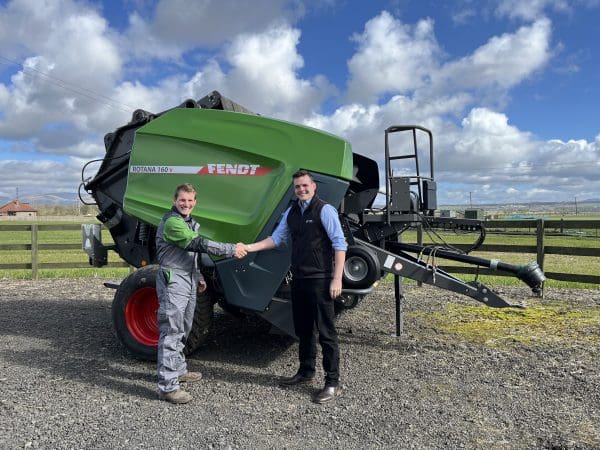
Dougie – We go back quite a few years actually, as we used to deal with Reekie for 50-odd years. My dad had a good relationship with Sam Mercer (Sales Manager), so there’s always been a link there, but our sales relationship paused for a bit after the Stirling depot was shut in 2016.
Since Reekie was taken over by the Hamilton Ross Group, we’ve bought machinery from a couple of the Area Sales Managers there, including Rory more recently.
Dougie – I get on well with Rory. He’s a nice lad, easy to work with. You can pick up the phone to him. And he sorts out any problems very quickly.
Rory – I like working with Dougie, because you get a good bit of feedback from him. He’s very honest with me – if he doesn’t like something, he’ll tell me about it. I enjoy dealing with not only Dougie, but the family as a whole, because they are very welcoming.
“We know we need to keep up with best practice, and be flexible to changing our farming practices if needs be.”
Dougie – We may need to change one tractor before long, one of our old ones that’s got over 12,000 hours. It’ll be a sad day when that old girl goes! But apart from that, nothing major.
Dougie – Like all farmers, we’re trying to get the best out of our stock and land. We carry out regular health checks on our animals and soil sampling of our ground. We know we need to keep up with best practice, and be flexible to changing our farming practices if needs be. We hope to be able to continue farming here and keep the family business going, hopefully for the next generation.
Get in touch with your local R&R Machinery Cupar depot to find out how you can order your own Fendt machine.
If you or someone you know has an interest in a career with the Hamilton Ross Group, please send your CV to [email protected] or visit our Indeed page.
